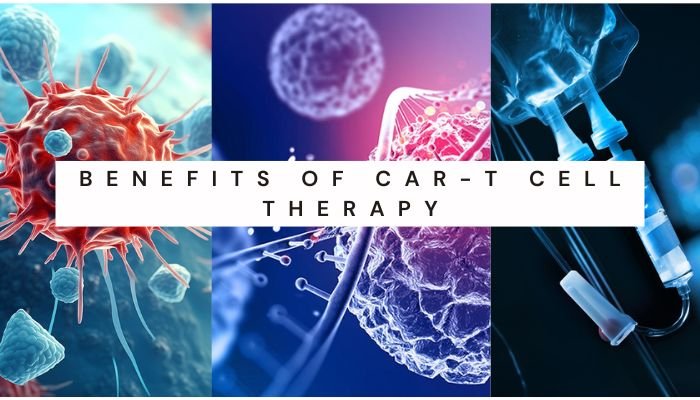Benefits Of CAR-T Cell Therapy: Future Of Cancer Treatment
Chimeric Antigen Receptor T-cell (CAR-T) therapy represents a groundbreaking advancement in the fight against cancer. By harnessing the power of the immune system to target and destroy cancer cells, CAR-T therapy has shown remarkable potential to transform cancer treatment. This article explores the benefits, current applications, and the promising future of CAR-T cell therapy.

Chimeric Antigen Receptor T-cell (CAR-T) therapy represents a groundbreaking advancement in the fight against cancer. By harnessing the power of the immune system to target and destroy cancer cells, CAR-T therapy has shown remarkable potential to transform cancer treatment. This article explores the benefits, current applications, and the promising future of CAR-T cell therapy.
Understanding CAR-T Cell Therapy
CAR-T cell therapy is an innovative form of immunotherapy. It involves genetically engineering a patient’s T cells (a type of white blood cell) to express chimeric antigen receptors (CARs) that recognize and attack specific proteins on cancer cells.
-
T Cell Collection: T cells are extracted from the patient’s blood.
-
Genetic Engineering: In a laboratory, the T cells are modified to produce CARs that target cancer cells.
-
Expansion: The modified T cells are multiplied to ensure a sufficient number for treatment.
-
Infusion: The engineered cells are infused back into the patient, where they seek and destroy cancer cells.
Benefits of CAR-T Cell Therapy
The benefits of Car-T cell theraphies are:
-
Precision Targeting of Cancer Cells:
CAR-T cells are designed to specifically target antigens expressed on cancer cells, minimizing damage to healthy tissues. This precision reduces the risk of systemic side effects often seen with traditional cancer therapies like chemotherapy and radiation.
-
High Efficacy in Resistant Cancers:
CAR-T therapy has demonstrated remarkable success in treating certain cancers that are resistant to conventional treatments, including: Acute Lymphoblastic Leukemia (ALL), Diffuse Large B-Cell Lymphoma (DLBCL), and Multiple Myeloma.
-
Durable Responses:
Many patients experience long-lasting remissions following CAR-T therapy, offering hope for those with relapsed or refractory cancers.
-
Potential to Cure Certain Cancers:
Unlike treatments that merely manage cancer, CAR-T therapy has shown potential to eliminate the disease entirely in some cases.
-
Reduced Reliance on Traditional Therapies:
By directly targeting cancer cells, CAR-T therapy can reduce or eliminate the need for chemotherapy and radiation, which often come with significant side effects.
Applications of CAR-T Cell Therapy
The primary success of CAR-T therapy has been in blood cancers such as ALL, DLBCL, and multiple myeloma. Ongoing research is focused on adapting CAR-T therapy to treat solid tumors, which pose unique challenges due to their microenvironment and antigen diversity. Researchers are exploring CAR-T therapy’s potential to modulate immune responses in autoimmune conditions.
Challenges and Future Directions
Researcher believe that car-t cell therapy is the future of cancer treatment. However it has some challeges who can need improved in future.
-
Cytokine Release Syndrome (CRS): A common side effect characterized by an overactive immune response. It is manageable with timely intervention.
-
Neurotoxicity: Rare neurological side effects, requiring close monitoring.
-
CAR-T therapy is currently expensive and not widely available. Efforts are underway to reduce costs and expand access globally.
-
Research is focused on improving CAR designs to effectively target solid tumors and navigate their challenging microenvironments.
-
Developing universal CAR-T cells derived from healthy donors could simplify the treatment process and broaden availability.
The Future of CAR-T Cell Therapy
Scientists are identifying novel antigens to expand CAR-T therapy’s application across a broader range of cancers. Advances in CAR design aim to minimize side effects while maintaining efficacy. CAR-T therapy is being integrated with other treatments, such as immune checkpoint inhibitors, to enhance outcomes. Advances in genomics and biotechnology will allow for even more tailored CAR-T therapies, improving success rates and reducing risks.
Conclusion
CAR-T cell therapy is a revolutionary advancement in oncology, offering hope to patients with previously untreatable cancers. Its precision, efficacy, and potential for durable remissions make it a cornerstone of modern cancer therapy. While challenges remain, ongoing research and innovation promise to expand its applications, reduce costs, and enhance accessibility, solidifying CAR-T therapy’s role as the future of cancer treatment.
What's Your Reaction?




















